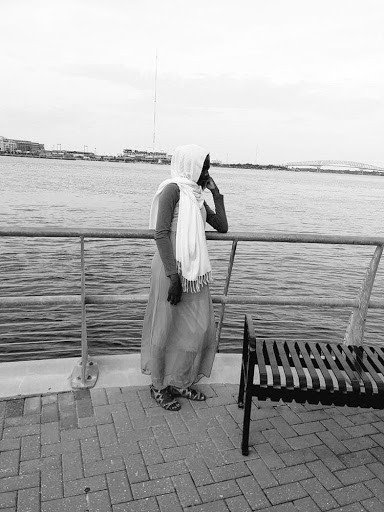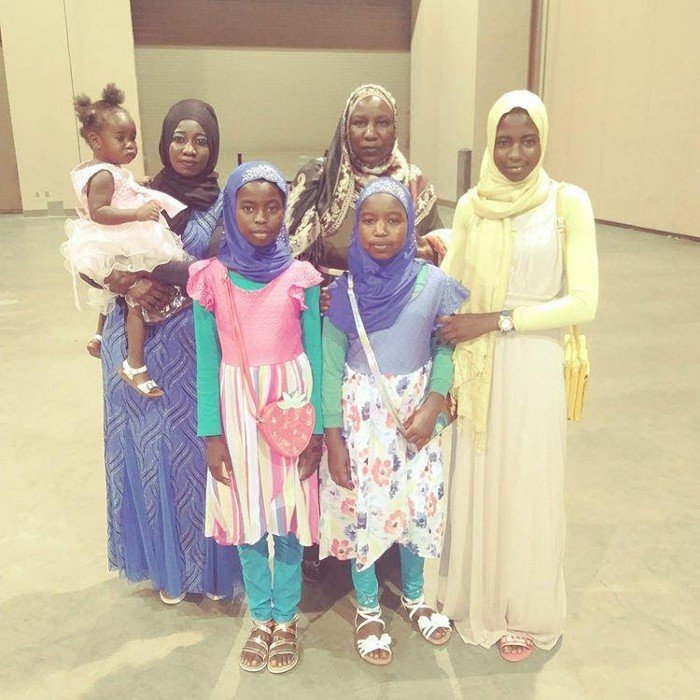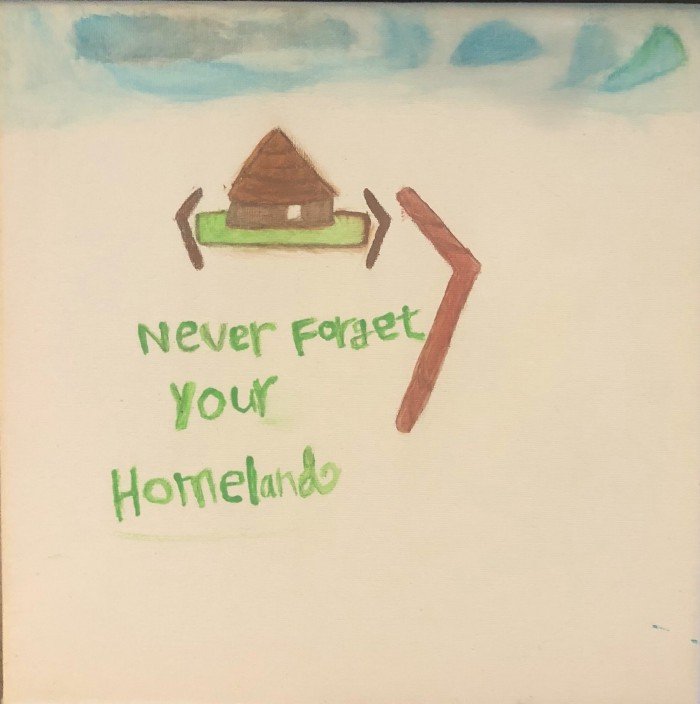Dar Salam Moussa: The evolution of a dream
By Dar Salam Moussa and Sheridan Block
Dar Salam Moussa in Jacksonville, Florida (Photo credit: Dar Salam Moussa)
As a young girl, Dar Salam Moussa’s dreams had her head in the clouds. She always wanted to be a pilot, soaring through the sky. Up there she could find peace — something she hadn’t really known back home in Darfur.
The first time Dar Salam left her home country, she was just a baby. She was born in 2003, just before conflicts between rebel forces and the Sudanese government escalated to become the first genocide of the 21st century. Civilians, especially those belonging to the Fur, Masalit and Zaghawa tribes, were targeted and killed. Their villages left in ruins at the hands of the merciless militiamen known as the Janjaweed.
Fortunately, Dar Salam and her family escaped across the border to Chad where they lived in refugee camps. Even though her childhood was spent on the move, her dreams followed and grew with her.
After a few years in Chad, Dar Salam and her family moved back to Darfur when her mother began studying at the university in Geneina. Her grandparents and several other relatives lived there. One of her fondest memories were early mornings making tea for her grandpa.
“He loved a cup of hot tea every morning, even though I never made it very well,” she said. “My favorite part of fixing my grandpa tea in the morning was hearing him sing songs for me.”
O’ Dar Salam, the girl who fights for Darfur
Rise once more
Your justice words turn the world around
I beg you, rise again
These sacred morning hours were pockets of peace for Dar Salam. Curled up in the warmth of her grandfather’s embrace erased the worries of the world around them. He told stories of Darfur in peace and the heroes who fought for Sudan. But these stories always ended in reality — the cycle of oppression, corruption and destruction that continued to rob the country she calls home.
“But someday, my little girl will fight for my country,” he would say.
The dream was planted and took shape. One day, Dar Salam would live up to her grandfather’s prophetic song. She would be the girl who fights for Darfur. She would become a pilot who would protect her people.
The world may have been shrouded in war, but life in Geneina was the closest thing to stability Dar Salam knew in her young life. Her family and friends were there. Her mother was a successful doctor, and her stepfather was a kind and loving man. She went to school.
“Everything in my life seemed to be going well,” she said. But this blissful dream was suddenly shaken when her father called one day.
Zakaria Moussa left for Libya after his divorce. Dar Salam was 5 years old. He lived and worked there for several years until the Libyan Civil War started in 2011. He moved between different refugee camps within the country before finally receiving the opportunity to come to the United States. Remembering his family back in Darfur, he desperately wanted to bring them overseas to a land of safety and opportunity.
The news shook Dar Salam when her mother broke the news. She couldn’t move to America. She would be leaving everything and everyone that she loves behind. A wave of emotions rushed over her. Sadness at having to leave. Anger at the thought of her mother agreeing to send her away. Fear of the unknown journey ahead. How could she fight for Darfur if she would leave it?
“Dar Naim,” her mother spoke her nickname softly. “I want you to remember your story. You always wanted to obtain a full education so that you could become a pilot and fight for your country. This is a strong goal and I want to let you fly.”
She knew her mother was right. In Sudan, girls don’t have many opportunities to go to school and pursue careers. By 15 years old, they’re expected to be married, have children and raise a family. Neither Dar Salam nor her mother wanted that. So in 2016, Dar Salam, her sister and stepsisters, and her stepmother left for Cameroon where they would stay until they received a permit to enter the US.
The wait in Cameroon took longer than expected. Since they were in transit to America and only waiting for resettlement documents, they were considered non-residents and couldn’t attend school. Still, Dar Salam and her sisters kept their minds sharp by reading and studying the Quran. Dan Salam became close friends with her neighbor Hanan. In the time spent waiting, she started to find herself at home in Cameroon.
“We’re just waiting for out immigration documents to come through,” she would remind herself, as if to keep from falling into another comfortable dream.
Dar Salam (pictured in yellow) and her family arriving in Jacksonville, Florida (Photo credit: Dar Salam Moussa
Nearly one year later, the wait would finally be over. On April 13, 2017, Dar Salam and her family received the approval to travel to America. They would arrive in Jacksonville, Florida, where her father would be waiting for them.
“It felt so surreal to finally be in America,” she said. “My first impression of the country was that it was fully of interesting scenes. I had never seen such tall buildings and huge bridges, and cars drove everywhere!”
More exciting than all the new sights was the thought of finally attending school again. It had been over a year since Dar Salam was in a classroom. Now she would have the chance to study hard, become a pilot, and return home to Darfur.
The summer they arrived seemed to drag. Thankfully, they had summer camp and volunteers taught them the alphabet and basic English phrases. At the end of the summer, they received backpacks full of pencils, notebooks and other school supplies. School was just around the corner!
School bells finally rang, and Dar Salam watched her sisters skip off to their first day at a nearby elementary school. She would be stuck at home that day. A miscommunication regarding her date of birth kept her from registering in the school district. Her father would need to provide an official copy of her birth certificate all the way from Sudan.
The news broke her heart. Going to school was all she cared about coming to the states, and now she couldn’t even do that. What would she do without school? Would she spend the rest of her life indoors with no books to read? How would she become a pilot? Was she destined to become a young wife and mother like the other girls back in Sudan? It was as if all her dreams were crumbling before her eyes.
“God, please help me to go to school,” she prayed.
That prayer would soon be answered. Her father worked tirelessly to expedite the process, splitting his time between immigration office visits, phone calls back to Sudan, and hundreds of dollars spent trying to retrieve Dar Salam’s birth certificate. Sometimes, he would miss work to make appointments. It took a handful of months before he came home one day with a large grin across his face. Dar Salam would finally go to school.
“I couldn’t sleep that night. I was thankful to God,” she said. “The next morning when it was finally time for me to go to class, I was so excited I could hardly contain myself!”
Her school uniform was a yellow shirt, black pants that went down to her ankles, and her headscarf. She was happy to have other Muslim girls in her class so she didn’t stand out so much. Her classrooms were filled with technology she never saw back in Darfur — projectors and laptops, even accessible Wifi was brand new. She could study a variety of extracurricular subjects like music, art, computer science and cooking. It was a huge difference from schools in Geneina where only one teacher taught students using a chalkboard.
It didn’t take long for Dar Salam to feel like her old self again. She did well in her studies, she had a number of new friends, her family around her was safe. She prayed often and worked hard, trying to not worry so much about all that was happening back in Darfur. Her new American life was a wonderful dream.
But another phone call would shake her out of that blissful dream.
“O’ Dar Salam is that you? Your stepfather was killed by the Janjaweed.”
It was as if she was immediately transferred back to the nightmare of war. The phone fell from her hands. A flood of tears streaked down her face. One of the most important people in her life was killed in the streets. Darfur was still bleeding.
“Death comes for us all, and we can do nothing to stop it,” she later reflected. “But my stepfather didn’t deserve to die in the hands of criminals.”
As the war in Darfur dragged on throughout the years, the rest of the world moved on. News reports fell silent. Even major humanitarian efforts were drawn back from the country. In a controversial decision last year, the United Nations withdrew its protection efforts, handing over responsibility to protect civilians in west Darfur to the Sudanese government. At the beginning of 2021, just weeks after the UN left, the Janjaweed attacked Geneina. Around 150 people were killed and nearly 200 injured. The continued violence has displaced another 100,000 since January.
“If no one starts fighting for the country, then nothing can change for the better,” said Dar Salam. “I wish I could be there to take off my shoes and fight them, but my duty is here. I have to fight to make Sudan a better place.”
Heartbroken but determined, Dar Salam’s dreams of defending Darfur flared. But she often felt conflicted as she dreamed of becoming a pilot. No Sudanese women were allowed to become soldiers. Fighting was reserved for men. If she couldn’t fight for her country in the military, how could she help the people she loved most. She felt powerless.
But in 2020, a new dream gave her hope.
Dar Masalit (“Home of the Masalit People”) picture by Dar Salam Moussa (Photo credit: Elizabeth Paul)
She saw herself fighting for Darfur, but not in a cockpit or in a military uniform. Instead, she fought with her words. She was a politician. She stood for freedom, peace, and civil and human rights. She delivered speeches that inspired young girls like her. Her words put an end to violence against villages.
“My people will finally be able to return to their country without fear.”
Then she woke up. While not yet a reality, she realized it was up to her to make this dream a reality.
“The word ‘politics’ has a bit of a stain on it, but I will be different,” she said. “I will do the things politicians only speak of.”
Now 18-years-old, Dar Salam is in full pursuit of her new dream as she graduates high school in Jacksonville.
“Peace in every home, on every street, and in every village of Darfur. This is my dream.”
Disclaimer: The views, information, or opinions expressed in this article are those of the author and do not necessarily represent those of WeaveTales and its employees.
Want to tell your story?
For more information contact our editorial admin at contact@weavetales.org.



